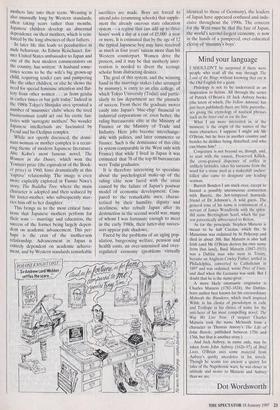Mind your language
I SHOULDN'T be surprised if there were people who read all the way through The Lord of the Rings without knowing that ent is the Old English for a giant.
Philology is not to be underrated as an inspiration to fiction. All through the series of Patrick O'Brian's 18 Jack Aubrey books (the latest of which, The Yellow Admiral, has just been published) there are little parenthe- ses giving the etymology of nautical phrases such as the bitter end or toe the line.
What I am more interested in, at the moment, is the origin of the names of the main characters. I suppose I might ask Mr O'Brian, but he lives in another country and besides he dislikes being disturbed, and who can blame him?
Conjecture is not beyond us, though, and, to start with the easiest, Preserved Killick, the cross-grained dispenser of coffee in unlikely latitudes, takes his surname from the word for a stone used as a makeshift anchor: killick also came to designate any leading seaman.
Barrett Bonden I am stuck over, except to hazard a possibly unconscious connection with Baretti, the hot-tempered homicide friend of Dr Johnson's. A wild guess. The general tone of his name is reminiscent of a servant of James Woodforde with the splen- did name Brettingham Scurl, which the par- son patriotically abbreviated to Briton.
As for the principals, Stephen Maturin is meant to be half Catalan, which fits. St Maturinus was ordained by St Polycarp and died in about 388. But Maturin is also half Irish (and Mr O'Brian derives his own name from that land). Basil Maturin (1847-1915) was a Dublin man who went to Trinity, became an Anglican Cowley Father, settled in Philadelphia, converted to Catholicism in 1897 and was ordained, wrote Price of Unity, and died when the Lusitania was sunk. But 1 doubt that he is the name-giver.
A more likely onomastic originator is Charles Maturin (1782-1824), the Dublin- born author best known for his extraordinary
Melmoth the Wanderer, which itself inspired Wilde in his choice of pseudonym in exile
and Trollope in his choice of name for the anti-hero of his most compelling novel, The Way We Live Now. (I suspect Charles Maturin took the name Melmoth from a character in Thomas Amory's The Life of John Buncle, published between 1756 and 1766, but that is another story.) And Jack Aubrey, in name only, may be taken from John Aubrey (1626-97) of Brief Lives. O'Brian uses some material from Aubrcy's quirky anecdotes in his novels. Though he seems too ancient a quarry for tales of the Napoleonic wars, he was closer in attitude and mores to Maturin and Aubrey than we are.
Dot Wordsworth


























































 Previous page
Previous page